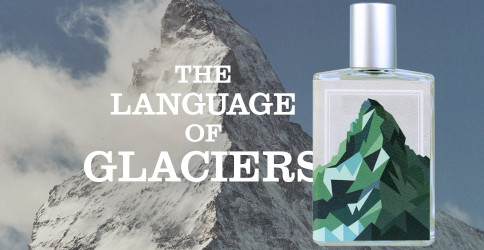
Indie brand Imaginary Authors will introduce The Language of Glaciers next week. Like the other fragrances in the line, it was inspired by an imaginary book by an imaginary author.
Finally, a fragrance for the introverts. This is not to say you can’t wear it out but it will act like a trusted parka when you do, enveloping you in grandeur and wonder.
SYNOPSIS: Have you ever stood alone atop a mountain with chunky snowflakes swirling all around? Such is the splendor you will experience within The Language of Glaciers, a romantic epic which reaches incredible heights and inspires one to leave no moment unappreciated. From the stillness of a moonlit snowshoe excursion, to the rush of witnessing an avalanche safely from above, the recollections of our unnamed narrator will captivate you the same way the solitary song of the snow owl captivated them. Find comfort in the cold and begin to see the world from stunning new perspectives. Critics have called it “A slow-paced story that will burrow straight to the center of your soul” and “Sharp as ice and smooth as a glacial lake.”
“Let’s do marvelous things, says the glacier, sit with me and consider the magnitude of what we are capable of.” - Margaux Zweig
The notes include white pine, lilac, cashmere, juniper, forget me not, blue bugle and virgin snowfall.
Imaginary Authors The Language of Glaciers can be pre-ordered now, $105 for 50 ml Eau de Parfum. (Hopefully the 14 ml size is coming later).
(via imaginaryauthors)
Sounds fun, though I’m usually more interested in the book than the actual perfume. The reverse seems to be true for this one though.
Oddly, this one is not getting me book or fragrance. That’s ok, I have warm fuzzies for IA anyway.
I’m with you Robin. Not interested, but I am okay with that.
It should probably be called The Language of Disappearing Glaciers.
The Dying Whispers of? The Last Gasp of?
Beautiful aesthetics. I actually love green bottles more than red bottles (!) but there are so few in green.
Definitely a good looking label.
The description of the imaginary book reminds me of the real book “Icefields” by Thomas Wharton, which I really enjoyed.
Interesting!